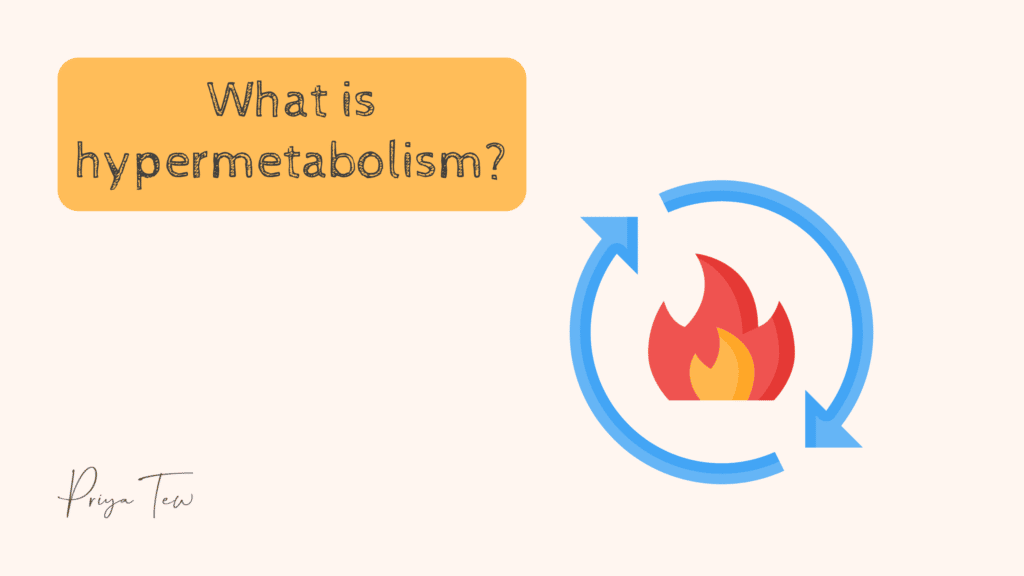Eating during recovery from an eating disorder isn’t necessarily as simple as just eating more or aiming for the typical calorie guidance for adults. Hypermetabolism in eating disorders is a process that can occur, where the metabolic rate increases more than you would imagine. The body needs extra energy and nutrition to heal and restore, but this can take a lot more energy than you would expect. In some instances people can need to eat 4000 plus calories a day due to a phenomenon called hypermetabolism. In eating disorder recovery, hypermetabolism can mean you might need to eat much, much more than you’d expect, just to maintain weight.
What is metabolism?
Metabolism refers to all the processes that occur in the body to sustain life on a day to day basis. This includes keeping all your cells alive, digesting food, all chemical reactions occurring in your body, going to the bathroom, moving muscles, maintaining body temperature and more. Metabolic rate is the energy required so that all of these processes can occur. This doesn’t even take into account any movement or activity for the day. Metabolic rate is the amount of energy required just to keep you alive.

How does metabolic rate change?
Dieting behaviours, disordered eating and eating disorders can all impact metabolic rate. When your body is not getting enough energy intake, it will start to shut down some functions in order to conserve energy. This can lead to your metabolic rate decreasing, known as Hypometabolism. You could think of this like the body going into power saving mode such as a mobile phone can do. Less essential functions can slow down or even stop.
During recovery, as you nourish yourself your metabolic rate will start to increase as your body starts to come back online. Sometimes there is an overshoot, this is where hypermetabolism can occur, where the metabolic rate increases further.
Whilst this may sound worrying it is a normal part of recovery, for some people it is more pronouced than for others. What it does mean is more energy is required (more food), to support basic bodily processes before there is any energy spare for weight gain.
Hypermetabolism can also be seen in bulimia nervosa and otherwise specified eating and feeding disorder (OSEFD).
It is not completely clear as to why hypermetabolism occurs, although it may in-part be due to the body temperature being elevated. Energy from food is used to produce this increased temperature rather than increasing body mass.
Hypermetabolism in eating disorder symptoms
How do you know you have hypermetabolism? There can be several tell-tell signs:
- Night sweats
- Irregular Heartbeat
- Insomnia
- Fatigue
- Anaemia
- Weight loss (or unable to gain)
- Shortness of breath
- Nervous system dysfunction
Recovery with hypermetabolism
Eating regular meals and snacks is essential. With your energy intake need increased it can feel frightening to have to eat double or triple the normal amount of food but remember this is only for a period of time and it will pass. It can feel strange to be eating so much more than your think your body needs, and it will potentially more than friends and family, but know that this is a key step in the recovery process. Eating this higher amount helps to support your body recovery functions such a menstrual cycle, hormonal function, sleep patterns and avoid unintentional weight loss too.
Working with a team who can support you is crucial, having a dietitian to help you plan out where to get your nutrition from and to suggest energy dense foods plus drinks. Support around the feelings and eating disorder thoughts in this time is also key, along as having those alongside you to help and carry you through day to day.
How much will I need to eat?
This is where things are not black and white. We are all individuals and therefore have individual needs. The literature tells the amount of calories people in a hypermetabolic state need can vary from 300-700kcal a day. Again this will be for a short period of time and then should calm down. However also it can be useful to know that your body may also need slightly more food than it did pre-eating disorder or in comparison to others.
Does hypermetabolism stop?
You may continue to experience hypermetabolism for a couple of months or even longer after achieving you “normal” or target weight. Keep eating sufficient calories as prescribed by your dietitian to maintain your new weight. Recovery can take take months and might not be linear, so do try to be patient and kind to yourself. It really is a marathon, not a sprint.
If you need help with your recovery, please reach out here for 1:1 support.
References:
- Peete, C., 2022. What is hypermetabolism? [online] The Health Board. Available at: <https://www.thehealthboard.com/what-is-hypermetabolism> [Accessed 18 November 2022].
- Marzola, E., Nasser, J.A., Hashim, S.A. et al. Nutritional rehabilitation in anorexia nervosa: review of the literature and implications for treatment. BMC Psychiatry 13, 290 (2013). https://doi.org/10.1186/1471-244X-13-290
Pingback: Hypermetabolism in eating disorders – Copy Book Health
Pingback: Hypermetabolism in eating disorders – Doctor Says Book
Pingback: Hypermetabolism in eating disorders – Health Exercise Book